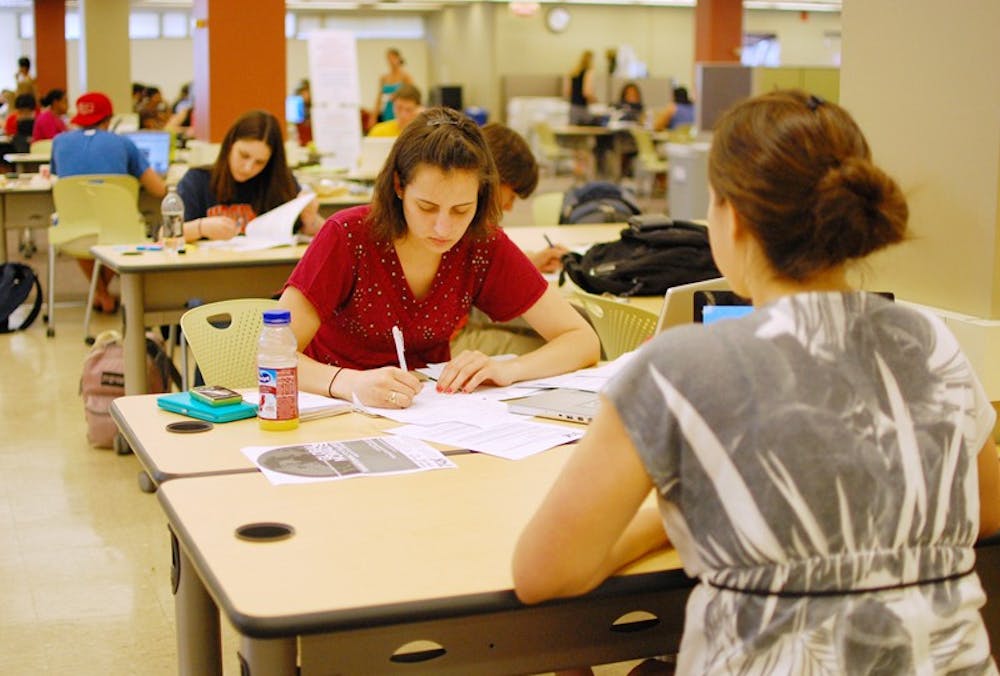The news and opinion Web site The Daily Beast ranked the University as the most stressful college in Virginia and the 36th most stressful college in the United States.
The online publication examined 50 top universities and ranked their stress level based on financial cost, competitiveness, acceptance rate, engineering and crime on campus. The financial costs and the academic rigor of the school were weighted at 35 percent each, and the acceptance rate, the strength of the graduate engineering program and the incidence of crime on campus each was weighted at 10 percent. Stanford University was listed as the most stressful college.
Coming in at No. 36, the University was cited as costing $18,092 for tuition, room and board, having an acceptance rate of 36.7 percent, a competitive academics ranking of 25, an engineering ranking of 30 and a crime ranking of 30.
Regardless of the University's ranking, it is difficult to quantify stress, which can be seen in a variety of shapes and forms, said Russ Federman, director of the University's Counseling and Psychological Services.
"Stress is such a generic term, it is hard to talk about stress as something simple and identifiable," he said.
One quantifiable measure is that CAPS sees 9 percent of the student body every year, a statistic that is "fairly significant," Federman said.
The University's participation in the University of Michigan's Healthy Minds Study for the 2008-09 school year also indicates there are "a fair amount of students who struggle each semester, every year," he said.
Of the 526 randomly surveyed University students, 55 percent reported a positive state of mental health, while the other 45 percent reported mental health concerns. Of the students surveyed, 22 percent also said they had felt significantly impaired by mental health issues for at least 3-5 days of the previous month.
Academic competition is one factor that contributes to the stress level of the student body, Federman said. In the Healthy Minds Survey, 31 percent rated University classes as "very competitive," and 34 percent rated them as "competitive." By contrast, only 14 percent of students at the other eight Virginia schools surveyed rated their schools as "very competitive."
"Academic competition here at U.Va. largely has to do with the academic striving that these students are used to," Federman said, pointing out that most University students are used to being at the top of their classes in high school.
Nevertheless, he added that even though the University is "a stressful environment", college in general is considered a very stressful time in one's life.
First-year Engineering student Maria Aristorenas, for example, said there is a larger magnitude of stresses in college in comparison to high school.
"We have the stress of many high-level classes, living independently and having to study much more material than we ever had to in high school," she said. "In both high school and college, we strive to be the best, but it was just easier to be the best in high school."
College students also could be under more pressure if their classes are more specialized in one area, such as in engineering programs, rather than covering diverse topics.
"It's more stressful to concentrate on one area, like having many similar physics and calculus classes together; It's overwhelming,," Aristorenas said.
Second-year College student Merritt Tuttle said some students could be more prepared than others to cope with stress, especially if they have been exposed to more stress in high school.
"I went to a very challenging high school, so I was very prepared for the shift, but others that didn't go to such a high school are much more stressed out," he said.
The University has many resources in place to help students deal with stress in its various forms. In addition to CAPS and other Student Health services, the Office of Residence Life and the resident advisers can be an important resource to help students cope with stress.
Resident Staff Co-Chair Meg Barry said health and wellness is a "top goal" for the organization and is one of the programming areas for which resident adviser training. The staff provides different programs, such as presentations by Peer Health Educators, to increase awareness of many health issues, including stress management. Barry also emphasized the importance of strong relationships between RAs and their residents in helping students to cope with stress.
Federman also provided some general suggestions for dealing with and avoiding stress, though he reiterated that stress comes in many different forms. In general, he said that "a healthy lifestyle has a huge impact on stress management."\nHe particularly emphasized that it is "essential" for students to get adequate sleep. In addition, limiting substance intake, eating well and exercising are all excellent methods for reducing stress and "living a balanced life".
-Stephanie Dodge contributed to this article







